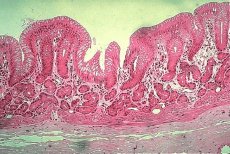Medical expert of the article
New publications
Achlorhydria
Last reviewed: 05.07.2025

All iLive content is medically reviewed or fact checked to ensure as much factual accuracy as possible.
We have strict sourcing guidelines and only link to reputable media sites, academic research institutions and, whenever possible, medically peer reviewed studies. Note that the numbers in parentheses ([1], [2], etc.) are clickable links to these studies.
If you feel that any of our content is inaccurate, out-of-date, or otherwise questionable, please select it and press Ctrl + Enter.

Achlorhydria is a disorder in which the stomach cells do not produce hydrochloric acid.
This disease is characterized by significant digestive disorders and a sharp deterioration in well-being, but in some cases the disease occurs without any particular symptoms (a person may be bothered by belching, heaviness after eating, and bowel disorder).
To date, there are no sufficiently effective treatment methods; replacement therapy is mainly prescribed.
With achlorhydria, the functioning of many organs of the digestive system is disrupted.
Achlorhydria can be functional and organic. Functional achlorhydria occurs due to a violation of the regulation of gastric secretion, organic achlorhydria develops with cancerous tumors, gastritis, benign formations in the stomach and other diseases in which the glandular apparatus changes.
Functional achlohydria is reversible, whereas organic achlohydria causes irreversible damage to stomach cells.
Achlorhydria of the stomach disrupts the natural digestion process, but the lack of hydrochloric acid is compensated by the increased work of other digestive organs, so a person may not suspect a disorder for a long time.
Reasons
Achlorhydria develops as a result of a disruption in the synthesis of hydrochloric acid, which can occur for a variety of reasons.
For example, if the immune system malfunctions, the body may begin to attack its own stomach cells, leading to the development of autoimmune gastritis.
Achlorhydria can also be caused by microorganisms living in the stomach, age-related changes, constant stress, endocrine disorders, the last stage of renal failure, and malignant tumors.
Symptoms
Achlorhydria does not manifest itself suddenly; symptoms of the disease appear as the disease progresses.
The symptoms are associated with impaired digestion of proteins from food.
Typically, patients with achlorhydria experience pain in the epigastric region (mild, moderate or severe), belching, bloating, a feeling of a full stomach, and nausea.
Often the disease is detected by chance (for example, during stomach diagnostics before surgery, in case of liver disease, etc.).
Diagnostics
Achlorhydria is diagnosed depending on individual clinical manifestations, without which it is impossible to determine the causes of the disease and prescribe effective treatment, since the same symptoms can indicate several diseases in the digestive tract.
If achlorhydria is suspected, the following is prescribed:
- specific antibody test;
- blood test for pepsinogen and gastrin levels;
- fibrogastroduodenoscopy (examination of the gastric mucosa using an endoscope, which can show the disease - pallor, thinness of the mucosa, and it is also possible to take a sample of gastric tissue for further examination);
- chromogastroscopy using dyes (introduction of dyes using an endoscope to assess the ability of parietal cells to produce hydrochloric acid);
- analysis of feces for the content of bacterial antigens;
What do need to examine?
What tests are needed?
Who to contact?
Treatment
Achlorhydria, unfortunately, does not have a specific treatment tactic. The therapy is based on replenishing the lack of hydrochloric acid and stimulating the active parietal cells. For treatment, it is better to use an individual program developed by a specialist.
The therapeutic course may include a special diet, medications, physiotherapy drugs, and traditional medicine.
The diet for achlorhydria should include foods that stimulate gastric secretion (cocoa, greens, cranberry juice, tomatoes, lemon, cabbage, rosehip decoction, weak coffee).
You can also add mineral waters to your diet (Essentuki No. 4 and 17, Narzan, Mirgorodskaya), which are best consumed warm.
Also, for achlorhydria, medications may be prescribed, which are selected individually by a specialist in each case.
Substitute drugs (3% hydrochloric acid solution, Acidin-pepsin, Abomin, etc.), drugs that stimulate gastric secretion (Lipamid, Etimizil, calcium preparations, etc.), polyenzyme drugs (Festal, Enistal, etc.), drugs that stimulate the restoration of the gastric mucosa (Befungin, sea buckthorn oil, Etaden, vitamin complex), corticosteroid hormonal agents (usually used for autoimmune gastritis) are used.
Physiotherapy procedures are prescribed for moderate achlorhydria.
Electrophoresis with calcium chloride, peloidotherapy, hyperbaric oxygenation, etc. help to increase the production of hydrochloric acid.
Among the methods of traditional medicine for reduced production of hydrochloric acid in the stomach, medicinal herbs are used in the form of decoctions, tinctures, and herbal applications.
Fennel, horseradish root, centaury, thyme, caraway, calendula, plantain, hops, which stimulate gastric secretion, help well with achlorhydria. Traditional methods show good efficiency in combination with other methods of therapy and are not suitable as an independent treatment.
More information of the treatment
Prevention
Achlorhydria is a consequence of some disease, therefore, as a preventative measure, it is recommended to follow a diet, alternate work and rest, and promptly treat existing diseases.
Forecast
Since achlorhydria is not an underlying disease, the prognosis for treatment depends on the underlying cause of the disorder.
Achlorhydria leads to decreased acidity of gastric juice, which disrupts the digestion process. Disruption of the secretory function of parietal cells occurs for various reasons, which can be both reversible and irreversible.
In this disorder, it is important to determine the cause that provoked the decrease in the secretory function of the stomach and eliminate it, otherwise there may be serious consequences.


 [
[